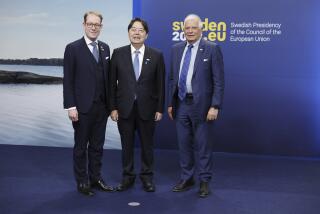Japan Should Take Wider Military Role, Panel Says
- Share via
TOKYO — Japan should abandon its passive, homeland-only defense policy of the past four decades and actively join and support U.S.- and U.N.-led efforts to resolve regional conflicts around the world, an advisory panel to the prime minister recommended Friday.
Instead of sitting at home, as it did during the Cold War, and “preparing for attacks on Japan’s territory” that are increasingly unlikely to occur, the country’s Self-Defense Forces should make participation in U.N. peacekeeping operations “a major duty,” the Advisory Group on Defense Issues said.
“The nation’s security concerns are worldwide,” the panel declared.
It also recommended that the government expand peacekeeping operations from strictly non-military missions to include operations involving infantry units in which the Japanese would bear arms “to a certain extent.”
Established in February by former Prime Minister Morihiro Hosokawa to draw up a post-Cold War defense strategy, the panel urged a far more active approach to international security than has been advocated by Socialist Prime Minister Tomiichi Murayama or either of the other leaders of his tripartite coalition.
Nonetheless, as a government report supported by the Japan Defense Agency, the recommendations promised to serve as the focus of debate over a new defense policy.
Murayama said the report contained recommendations he did not agree with and said only that he would use the report “as a reference” in setting defense policy. In his first news conference as prime minister last month, he ruled out peacekeeping missions in which Japanese troops would bear arms.
Murayama also astonished the nation by scrapping his Socialist Party’s four-decade insistence that Japanese armed forces were unconstitutional. But he quickly pledged to work for disarmament and imposed a severe 0.9% cap on the increase in the defense budget for next year. Defense spending now amounts to $46.8 billion.
Declaring that “international cooperation centering on the United States provides a realistic basis of a post-Cold War security system,” the defense panel said active Japanese participation in overseas peacekeeping would encourage the United States to continue providing leadership for such multinational missions.
The group also endorsed an increase in payments to support U.S. troops stationed in Japan, acceptance of an American proposal to jointly develop an antiballistic missile system for Japan and the signing of a North Atlantic Treaty Organization-style agreement that would enable Japan for the first time to provide logistic support, supplies and services to U.S. troops here.
At present, if a conflict broke out on the Korean peninsula, Japan would be legally unable to support American troops fighting there.
The advisory group recommended cuts in the number of fighter aircraft, tanks and anti-submarine warfare ships the country maintains. But more spending was recommended for sophisticated new weapons and intelligence-gathering equipment, including satellites, among other items.
From Japan’s defeat in World War II until Parliament enacted an international peacekeeping law in 1992, Japanese troops had been banned from overseas assignments.
So far, Japan has dispatched small bands of noncombat peacekeeping forces to Cambodia and Mozambique and is now studying whether to send troops on a humanitarian mission to Rwanda.
More to Read
Sign up for Essential California
The most important California stories and recommendations in your inbox every morning.
You may occasionally receive promotional content from the Los Angeles Times.












